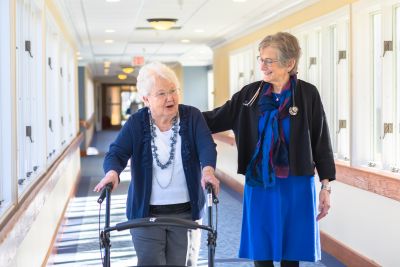 As our loved ones age, ensuring they have the right level of care and support is crucial. While some seniors may thrive in environments that offer occasional help, others may require around-the-clock care due to more complex medical conditions. Two common options for senior care are assisted living and skilled nursing care, but understanding which option is right for your loved one can be confusing at first. Here’s what you need to know to make a more informed decision for your family.
As our loved ones age, ensuring they have the right level of care and support is crucial. While some seniors may thrive in environments that offer occasional help, others may require around-the-clock care due to more complex medical conditions. Two common options for senior care are assisted living and skilled nursing care, but understanding which option is right for your loved one can be confusing at first. Here’s what you need to know to make a more informed decision for your family.
What Is Assisted Living?
Assisted living is designed for seniors who are mostly independent but require some help with daily activities and personal care. These can include dressing, bathing, taking medications, and preparing meals. Assisted living professionals can also help seniors with some healthcare needs, but they are not equipped for high-level or complex medical care. Each client receives a personalized care plan based on their individual needs, such as medication management or assistance with mobility.
There are two primary ways to receive assisted living care: in a retirement community that offers this service, or through professional care at home services, sometimes also referred to as a visiting nurse service. The main difference between communities that offer assisted living vs. in-home care is that home care services allow older adults to age in place for as long as it’s safe and feasible to do so.
Assisted living communities, on the other hand, provide a home-like environment in which residents have their own apartments or shared rooms as well as access to communal areas like dining rooms, lounges, and gardens. The best choices for this purpose are continuing care retirement communities (CCRCs) because they offer living arrangements for all levels of care and prioritize senior independence and wellness. In addition to personal and light medical care as part of their assisted living programs, CCRCs also offer:
- Homes pre-equipped with safety and mobility-enhancing features, such as elevators, no-step thresholds, ramps, handrails, and grab bars
- On-site medical facilities
- Classes, social events, and hobby facilitation to promote emotional and cognitive health
- Wellness programs and facilities, such as fitness centers, senior-friendly fitness classes, and hiking trails
- Included property upkeep and maintenance, allowing seniors to live a safer and more carefree lifestyle
- The ability to change or upgrade levels of care easily as needed (for singles or couples) while living on the same campus
Just as they would at home, assisted living residents in CCRCs have a great deal of autonomy in their daily routines and activities. They can choose what time to wake up, which meals they prefer, and how to spend their day. In short, assisted living programs in CCRCs are best suited for individuals who value and can function with a large degree of independence but benefit from support in handling everyday tasks.
What Is Skilled Nursing Care?
 Skilled nursing care is much more intensive and provides a higher level of medical care than assisted living. Recipients of skilled nursing care often have conditions that require constant monitoring or specialized treatments that aren’t available in assisted living services or settings.
Skilled nursing care is much more intensive and provides a higher level of medical care than assisted living. Recipients of skilled nursing care often have conditions that require constant monitoring or specialized treatments that aren’t available in assisted living services or settings.
This option is generally best for those recovering from surgery, managing chronic illness, or who have complex health needs.
As with assisted living, older adults may (depending on their individual health conditions) be able to opt for either in-home skilled nursing care or residing in a skilled nursing facility or CCRC.
Again, the primary difference between communities that have a skilled nursing facility vs. home health care is that home health care allows seniors who don’t require hospitalization to age in place longer. Conversely, skilled nursing care in a CCRC offers patients the benefit of many of the other amenities and advantages already mentioned — and peace of mind for family and friends.
Skilled nursing facilities also have the advantage of being staffed with not just licensed nurses, but doctors and other types of medical professionals who can offer a wide range of medical services, from physical therapy to wound care. They offer:
- Around-the-clock medical care. Registered nurses are always available to administer medications at any time of day or night, monitor health conditions, and provide specialized care for chronic illnesses or serious health issues.
- Rehabilitation services. Skilled nursing care often includes rehabilitation services such as physical therapy, occupational therapy, and speech therapy to help residents recover after surgeries or manage long-term conditions.
- Structured environment. Because the care is more medically focused, skilled nursing facilities tend to have a more structured daily routine, with staff closely monitoring residents’ health and well-being at all hours.
Making the Right Decision
Whether to choose assisted living or skilled nursing care depends on the individual needs of your loved one. If they are mostly independent but need occasional help, assisted living might be the perfect fit. However, if they require round-the-clock medical care and support, skilled nursing care will be more appropriate.
By understanding the similarities and differences between these two types of care, you can better match your loved one’s needs with the right environment, ensuring their safety, well-being, and quality of life in the years to come.
Give Your Loved One the Care That’s Right for Them With RWC
Rappahannock Westminster-Canterbury is a continuing care community providing the highest quality living experience for discerning senior adults. Situated on 165 beautiful acres outside the village of Irvington in Virginia’s Northern Neck, RWC residents choose to live here for the independent and worry-free lifestyle afforded in a tranquil setting as well as a wide variety of wellness resources.
As a CCRC, we offer the best of all worlds with independent living, assisted living, and licensed nursing care on site. With our Total LifeCare program, we’ve added the security of lifetime residency and pre-arranged health care services. Should the need for skilled care arise, the only charges over the monthly fee for an apartment or home would be for additional meals and support services.
If you decide to stay at home but need help with some everyday tasks, RWC can help. Our At Home with RWC department delivers personal care, companion care, or nursing care right to your doorstep. All services are monitored by a registered nurse. Enrollees pay a fee to participate in the program. Go to athomerw-c.org to learn more.
Contact us today for lunch and a tour of our beautiful campus. Alternatively, request a brochure to learn more about helping your loved one live their best life at RWC!
